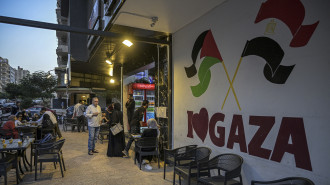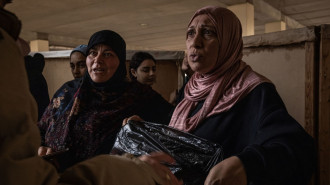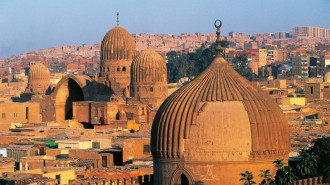![The literature festival Palestine Writes is being held at the University of Pennsylvania this week. [Online festival flier]](/sites/default/files/styles/image_360x240/public/2023-09/369466791_748965637238350_8747910048469667255_n.jpg?h=7ef6aaf6&itok=mJOhAhTu)
Palestinian literature festival goes live in Philadelphia
![The literature festival Palestine Writes is being held at the University of Pennsylvania this week. [Online festival flier]](/sites/default/files/styles/image_360x240/public/2023-09/369466791_748965637238350_8747910048469667255_n.jpg?h=7ef6aaf6&itok=mJOhAhTu)
Palestine Writes, a multidisciplinary cultural festival, is taking place at the University of Pennsylvania this week, featuring a range of arts, from literature to cooking to photography.
The nearly week-long festival, which started on Tuesday with preview events and will be having its official opening ceremony on Friday, will run through the weekend at different locations on the university campus.
Organisers and participants say they are aiming to celebrate Palestinian culture, connect with friends and have empowering conversations through music, poetry and art.
"We will talk about our heritage and our art. I'm excited about that to happen. We've missed a lot with Covid," Susan Muaddi Darraj, director of publishing for Palestine Writes, tells The New Arab, noting that their first festival in 2020 had to be online due to the pandemic.
This year will be the second Palestine Writes festival, which organisers hope will be held every two years moving forward. This week's programme has attracted 3,000 unique registrations, leading to the closure of ticket sales around a week before the festival.
Like many Palestinian events, the publicity around Palestine Writes did not pass without controversy. Earlier this month, allegations were raised in the press of antisemitic speakers presenting their work at the festival. The controversy is mainly centered around five (out of around 100) speakers who have made past critical or angry statements about Israel.
In response, U Penn issued a public statement standing with the festival's right to free speech and diversity of opinion, though stopping short of standing by the content of the event.
"We unequivocally — and emphatically — condemn antisemitism as antithetical to our institutional values. As a university, we also fiercely support the free exchange of ideas as central to our educational mission. This includes the expression of views that are controversial and even those that are incompatible with our institutional values," the university said in a public statement.
Though the controversy was expected, given the polarisation surrounding Israeli and Palestinian politics, those behind the festival have been nevertheless grateful for the support from students, the public and liberal Jewish groups.
In fact, those taking part in the programme are quick to emphasise the intersectionality of topics and speakers, including Native Americans, Blacks, Asians, Latinos and Jews.
Moreover, there will be discussions on LGBTQ+ rights, feminism and animal rights. The festival's menu will be all vegan, in the spirit of upholding the rights of all living things, says Darraj.
Organisers say that while they're trying to be as inclusive as possible, they're also hoping to expose attendees to Palestinian artists from the Middle East who are not well known in the West.
To bridge any language gaps, there will be simultaneous interpretation available from Arabic to English and to American Sign Language.
"I'm really excited that the festival is happening in person," Malini Johar Schueller, who took part in organising the virtual event in 2020, tells The New Arab.
"I hope that Palestinian literature and culture will get the kind of recognition it deserves."
![Palestinians mourned the victims of an Israeli strike on Deir al-Balah [Getty]](/sites/default/files/styles/image_684x385/public/2024-11/GettyImages-2182362043.jpg?h=199d8c1f&itok=xSHZFbmc)


![The law could be enforced against teachers without prior notice [Getty]](/sites/default/files/styles/image_684x385/public/2178740715.jpeg?h=a5f2f23a&itok=hnqrCS4x)
 Follow the Middle East's top stories in English at The New Arab on Google News
Follow the Middle East's top stories in English at The New Arab on Google News


